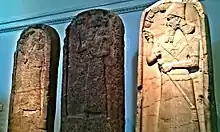stela
English
Etymology
From Latin stēla, from Ancient Greek στήλη (stḗlē). Doublet of stele.
Pronunciation
- IPA(key): /ˈstiːlə/
- Rhymes: -iːlə
- Hyphenation: ste‧la
Noun
stela (plural stelas or stelae or steles)
- (archaeology) an obelisk or upright stone pillar, usually as a primitive commemoration or gravestone
- 1776, R. Chandler, Trav. Greece, VIII 35:
- In the courts of the houses lie many round stelæ, or pillars, once placed on the graves of the Athenians.
- 1837, J. G. Wilkinson, Manners & Customs of the Anc. Egyptians, I ii 101:
- He erected a stela, with an inscription in the sacred character, to commemorate his successes.
- 1876, S. Manning, Land of Pharaohs, section 203:
- The upright blocks or stelas are among the most curious parts of the present ruin.
- 1893, E. A. T. W. Budge, Mummy, section 30:
- Thothmes I. set up two stelæ near the Euphrates.
- 1966, Paul Bowles, Up Above the World:
- A shore excursion had been arranged for the passengers who were interested in visiting the stelae of San Ignacio.
Synonyms
Translations
Czech
Pronunciation
- IPA(key): [ˈstɛla]
Related terms
- stelouc
Icelandic
Etymology
From Old Norse stela, from Proto-Germanic *stelaną.
Pronunciation
audio (file)
Verb
stela (strong verb, third-person singular past indicative stal, third-person plural past indicative stálu, supine stolið)
Derived terms
- stela frá (to rob somebody)
- stelast
- stelast burt
- stelast til
- stela undan (to misappropriate, to embezzle)
Related terms
Latin
Etymology 1
Borrowed from Ancient Greek στήλη (stḗlē, “block of stone”).
Declension
First-declension noun.
| Case | Singular | Plural |
|---|---|---|
| Nominative | stēla | stēlae |
| Genitive | stēlae | stēlārum |
| Dative | stēlae | stēlīs |
| Accusative | stēlam | stēlās |
| Ablative | stēlā | stēlīs |
| Vocative | stēla | stēlae |
Descendants
References
- “stela”, in Charlton T. Lewis and Charles Short (1879) A Latin Dictionary, Oxford: Clarendon Press
- stela in Gaffiot, Félix (1934) Dictionnaire illustré latin-français, Hachette.
Etymology 2
Derived from simplification of the geminate ll due to the preceding long vowel. Attested in the Anonymous Valesianus II.
Declension
First-declension noun.
| Case | Singular | Plural |
|---|---|---|
| Nominative | stēla | stēlae |
| Genitive | stēlae | stēlārum |
| Dative | stēlae | stēlīs |
| Accusative | stēlam | stēlās |
| Ablative | stēlā | stēlīs |
| Vocative | stēla | stēlae |
Descendants
- see: stēlla
References
- Adams, James Noel. 1976. The text and language of a Vulgar Latin chronicle (Anonymous Valesianus II). London: Institute of Classical Studies. Page 34.
Norwegian Nynorsk
Alternative forms
- stele
- stållå (Trøndelag dialect)
Etymology
Inherited from Old Norse stela, from Proto-Germanic *stelaną. Compare Icelandic stela, Danish stjæle, Norwegian Bokmål stjele, Swedish stjäla, Faroese stjala.
Verb
stela (present tense stel, past tense stal, past participle stole, passive infinitive stelast, present participle stelande, imperative stel)
Synonyms
- knabba
- naska
References
- “stela” in The Nynorsk Dictionary.
Old Frisian
Etymology
From Proto-West Germanic *stelan, whence also Old English stelan, Old Saxon stelan, Old High German stelan, from Proto-Germanic *stelaną, whence Old Norse stela.
Descendants
- West Frisian: stelle
Old Norse
Alternative forms
Etymology
From Proto-Germanic *stelaną, whence also Old English stelan, Old Frisian stela, Old Saxon stelan, Old High German stelan, Gothic 𐍃𐍄𐌹𐌻𐌰𐌽 (stilan).
Conjugation
| infinitive | stela | |
|---|---|---|
| present participle | stelandi | |
| past participle | stolinn | |
| indicative | present | past |
| 1st-person singular | stel | stal |
| 2nd-person singular | stelr | stalt |
| 3rd-person singular | stelr | stal |
| 1st-person plural | stelum | stálum |
| 2nd-person plural | stelið | stáluð |
| 3rd-person plural | stela | stálu |
| subjunctive | present | past |
| 1st-person singular | stela | stæla |
| 2nd-person singular | stelir | stælir |
| 3rd-person singular | steli | stæli |
| 1st-person plural | stelim | stælim |
| 2nd-person plural | stelið | stælið |
| 3rd-person plural | steli | stæli |
| imperative | present | |
| 2nd-person singular | stel | |
| 1st-person plural | stelum | |
| 2nd-person plural | stelið | |
| infinitive | stelask | |
|---|---|---|
| present participle | stelandisk | |
| past participle | stolizk | |
| indicative | present | past |
| 1st-person singular | stelumk | stálumk |
| 2nd-person singular | stelsk | stalzk |
| 3rd-person singular | stelsk | stalsk |
| 1st-person plural | stelumsk | stálumsk |
| 2nd-person plural | stelizk | stáluzk |
| 3rd-person plural | stelask | stálusk |
| subjunctive | present | past |
| 1st-person singular | stelumk | stælumk |
| 2nd-person singular | stelisk | stælisk |
| 3rd-person singular | stelisk | stælisk |
| 1st-person plural | stelimsk | stælimsk |
| 2nd-person plural | stelizk | stælizk |
| 3rd-person plural | stelisk | stælisk |
| imperative | present | |
| 2nd-person singular | stelsk | |
| 1st-person plural | stelumsk | |
| 2nd-person plural | stelizk | |
Descendants
References
- “stela”, in Geir T. Zoëga (1910) A Concise Dictionary of Old Icelandic, Oxford: Clarendon Press
Polish

Pronunciation
- IPA(key): /ˈstɛ.la/
Audio (file) - Rhymes: -ɛla
- Syllabification: ste‧la
- Homophone: Stela
Noun
stela f
Declension
Further reading
- stela in Polish dictionaries at PWN